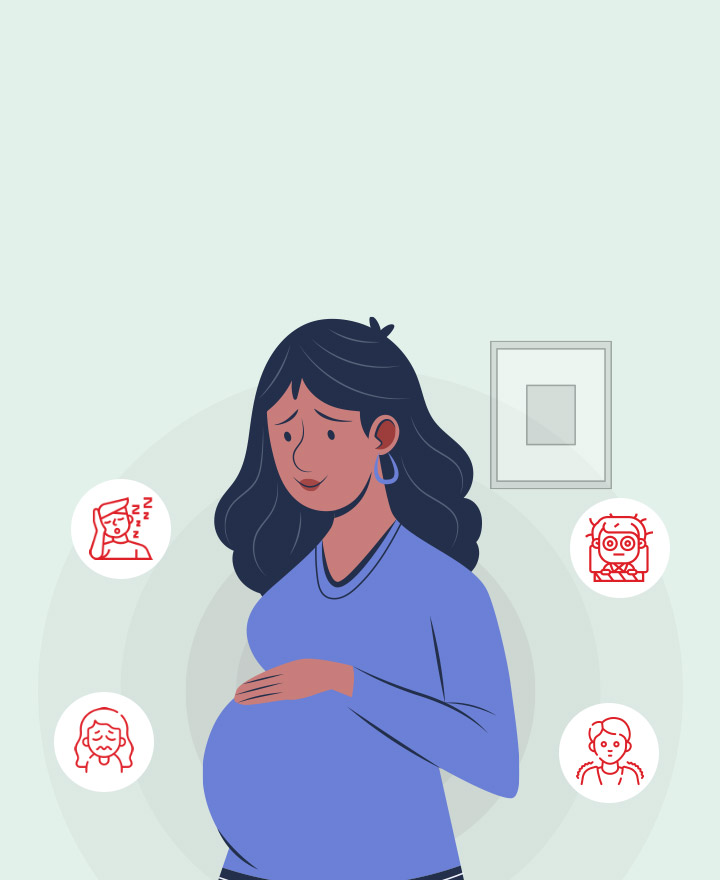

Everything to know about Perinatal Depression
Perinatal depression is a feeling of sadness and hopelessness that a woman experiences for a prolonged period in the weeks immediately before and after childbirth. Many physical and psychological factors contribute to and worsen perinatal depression. However, it can be managed and treated using the proper medication and professional counselling.
Perinatal Depression
"Perinatal" refers to the time immediately before and after childbirth. Perinatal depression is a collective term including prenatal depression (before childbirth) and postpartum depression (after childbirth).
Pregnancy and childbirth bring about many changes to a woman's physical, mental and emotional state. These changes may lead to sadness or hopelessness in some women. If this sadness persists for an extended period, it can lead to depression during pregnancy and after childbirth.
Perinatal depression can cause behavioural changes and disrupt a person's ability to function well. Therefore, seeking help, support and medical attention is very important. Fortunately, perinatal depression can be treated with the right clinical treatments, and medication and most women feel much better with the progression of time.
Signs and symptoms
Following are the identifiable symptoms of perinatal depression:
1. Getting nervous, tense, uneasy, and anxious
2. Concern about circumstances beyond your control
3. Feel tired and exhausted easily
4. Having trouble focusing
5. Socially anxious behaviour, such as avoiding children or public interactions
6. Panic disorders
7. Lack of sleep or insomnia
8. Feeling muscle stiffness
9. Getting scared or fearful
10. Often restless
Symptoms of Generalized Anxiety Disorder (GAD), Obsessive-Compulsive Disorder (OCD), social anxiety, and panic syndrome are also often observed in women with perinatal depression.
Causes of Perinatal Depression
Perinatal depression has several physical, psychological, and interpersonal risk factors. On average, women are twice as likely to experience depression than males.
Hormonal and physical changes can trigger depression during pregnancy and after childbirth. While specific causes differ from person to person, here are factors that increase the risk of experiencing perinatal depression.
• Unexpected pregnancy
1. Family history of depression
2. External stressors such as your job, finances, or health problems
3. Going through or having parental anxiety
4. Lack of emotional support
5. Unhealthy relationship
6. Facing any obstetric labour complications
7. Hormonal changes
8. Lack of sleep and rest
Treatment for Perinatal Depression
Several approaches have proved successful in combating perinatal depression.
1. Medication:
Your medical practitioner may prescribe antidepressants, depending on your condition. Selective serotonin reuptake inhibitors are often used as they are supposed to be safe for expectant mothers and nursing moms. No information indicates that taking antidepressants during pregnancy affects the unborn child in the long run. However, as all medications can have undesirable side effects, it is best to discuss medical treatment with your doctor or adopt other treatments during pregnancy if you are worried.
2. Psychotherapy or Other Alternative Therapies:
Talk therapy has been observed to help people with perinatal depression. Taking time out for yourself and speaking to someone you trust can help identify the problems you are facing and look for possible solutions.
3. Complementary Therapies:
Several complementary therapies have also proven effective in aiding women suffering from perinatal depression, including massage and acupuncture treatments.
It is important to note that perinatal depression can turn chronic and severe if not treated properly. It is hazardous to the well-being of a mother and her baby, so any possible treatment despite the risks is highly advised. Early diagnosis and treatment are most effective in combating perinatal depression.
Conclusion
Women commonly experience perinatal depression in the weeks before and after childbirth. Various internal and external factors can cause and worsen perinatal depression. It is a severe mental disorder that needs medical attention and psychological counselling. It is best to seek help from medical professionals who are certified in dealing with such conditions, and imperative that you avoid self-medication. Perinatal depression can be successfully treated by seeking medical help, taking your prescribed medication, joining communities for better social interactions, and special therapies as advised.
Source: Verywellmind, Healthline
Disclaimer: This blog provides general information and discussions about health and related subjects. The information and other content provided in this blog, website or in any linked materials are not intended and should not be considered, or used as a substitute for, medical advice, diagnosis or treatment. Kindly contact your Doctor before starting a new medicine or health regime.
Related Articles
Postpartum Weight Loss Guide - 9 Tips To Lose Weight After Pregnancy!
Postpartum Depression – All You Need To Know
Postpartum Care For New Moms - Everything You Should Know
Published on August 01, 2022

















 Health Insurance
Health Insurance  Travel Insurance
Travel Insurance  Car Insurance
Car Insurance  Cyber Insurance
Cyber Insurance  Critical Illness Insurance
Critical Illness Insurance
 Pet Insurance
Pet Insurance
 Bike/Two Wheeler Insurance
Bike/Two Wheeler Insurance  Home Insurance
Home Insurance  Third Party Vehicle Ins.
Third Party Vehicle Ins.  Tractor Insurance
Tractor Insurance  Goods Carrying Vehicle Ins.
Goods Carrying Vehicle Ins.  Passenger Carrying Vehicle Ins.
Passenger Carrying Vehicle Ins.  Compulsory Personal Accident Insurance
Compulsory Personal Accident Insurance  Travel Insurance
Travel Insurance  Rural
Rural